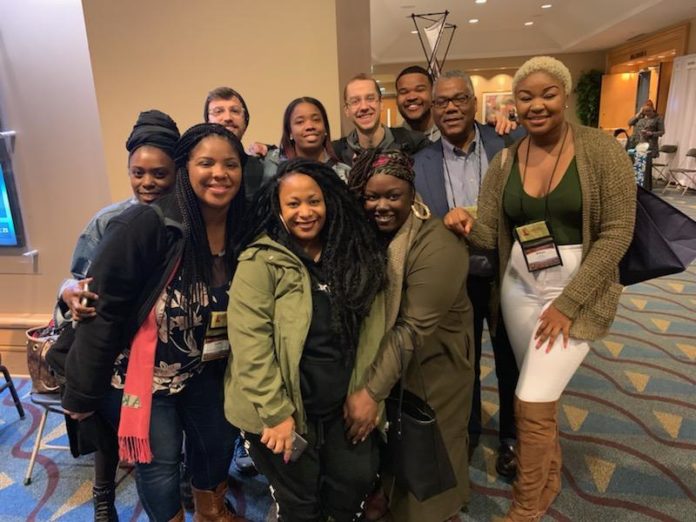
Samuel DeWitt Proctor Conference was an unforgettable, impactful conference that ignited hope, recharged passion, and stimulated spiritual formation and an answer to the call of reformation, reparation, and restoration for all. Attendees throughout the United States, from an array of backgrounds culturally, religiously, and socio-economically gathered to commemorate the journey of the “African American Quad-Centennial”* year, black liberation theology, and honor the feet of those who embraced Micah 6:8 as their duty to “act justly and to love mercy and to walk humbly[ with God.” The conference honored the legacies of “courageous father of Black Liberation Theology, late Dr. James H. Cone, and one of the mighty Mothers of Womanism, late Dr. Katie Cannon (proctor2019.org).” The conference theme, “The Cry of Black Blood: The Call to Sacred Memory” was centered around two scriptures.
This is what the Lord Almighty says: “Consider now! Call for the wailing women to come; send for the most skillful of them.” Jeremiah 9:17 (NIV)
But take care and watch yourselves closely, so as neither to forget the things that your eyes have seen nor to let them slip from your mind all the days of your life; Make them known to your children and your children’s children…Deuteronomy 4:9 (NRSV)
Empowerment sessions were interwoven between the general plenary sessions and attendees gathered to cry, to learn, to glean, to share, to speak, to heal, and to be healed. As a first-time attendee, it was one of the most transcendental experiences that I have ever encountered. Strength was imparted through the testimonials and moments of truth telling, the courage of the speakers to boldly declare that as believers God has called us to fight the social justice incongruities that have kept so many in bondage. Walking through the hallways through each session, you could see seminarians talking to their elders, fellowshipping with their peers, and impactful exchanges of dialogue that would ignite in deep conversations and solutions to answering the cry of black blood and all blood. One of the moments, that triggered a memory for me in my own personal journey, was the worship service held at historic Sixteenth Street Baptist Church — the place of the 4 little girls who were victims of the brutal hate crime, the bombing of September 15, 1963. As a native of Birmingham, I grew up with the stigma of Jim Crow laws that plagued our city and the consequences of such segregation that still had effect even for me as a millennial. As I observed everyone in attendance at the worship service proudly sing, the Negro national anthem, these lyrics continued to stir in my spirit:
Stony the road we trod,
Bitter the chastening rod,
Felt in the days when hope unborn had died;
Yet with a steady beat,
Have not our weary feet
Come to the place for which our fathers sighed?
We have come over a way that with tears has been watered,
We have come, treading our path through the blood of the slaughtered,
Out from the gloomy past,
Till now we stand at last
Where the white gleam of our bright star is cast.
At that moment, I realized I was at a place where mothers and fathers had sighed over the loss of loved ones, the struggle to freedom, life, liberty and the pursuit of justice for all. The tears that trailed before me, watered the soil that I would tread upon and be able to attend schools and universities that I never would have imagined. The blood of the slaughtered would be the feeding ground for new hope, life, and opportunities.
This conference was more than a gathering. It was a call to action. As Dean Greg DeLoach would say, at our Faculty-Staff retreat, it was a moment where truth was spoken and lived through the clarion call of a barbaric yawp that dared to defy the status quo. As I glanced the room filled with a multi-generational audience, diverse, and yet, unified on the call to eradicate such injustices that had claimed the lives of others and affected generations to come, I prayed silently, asking God to catch this wind of grace to be able to stand like the individuals that surrounded me. I would revisit this moment again, when I would be inspired by our own McAfee student, Brittini Palmer as she prayed with such courage and power at the closing of a plenary session. It took me back to the moment that I answered the “call” and I knew without a doubt, that I had to respond. As Brittini called on the name of ABBA Father, all attendees held hands, and for me I embraced a flash of Dr. Samuel Dewitt Proctor’s vision of the “genuine” community that God desired we all achieve. All attendees shared stories of trauma, cried, laughed, released holy anger, and came together to ask God for strategies, strength, and success to impact generations to come. I have no doubt that this conference exemplified the glorified trajectory that Dr. Samuel Dewitt Proctor declares, “God has made of one blood all nations. . . .And from this grand premise we then rebuild our attitudes, redesign our strategies, redefine our goals, and reorder our priorities to conform to the will of God (Proctor, 501).”
Forever changed,
Tiffany M. Stubbs, 1st Year Student
*The African American Quad-Centennial Year refers to beginning of African slavery in America that happened 400 years ago with the forced arrival of Africans in Virginia
Photo Credit: Tiffany Burch, 2nd year student










